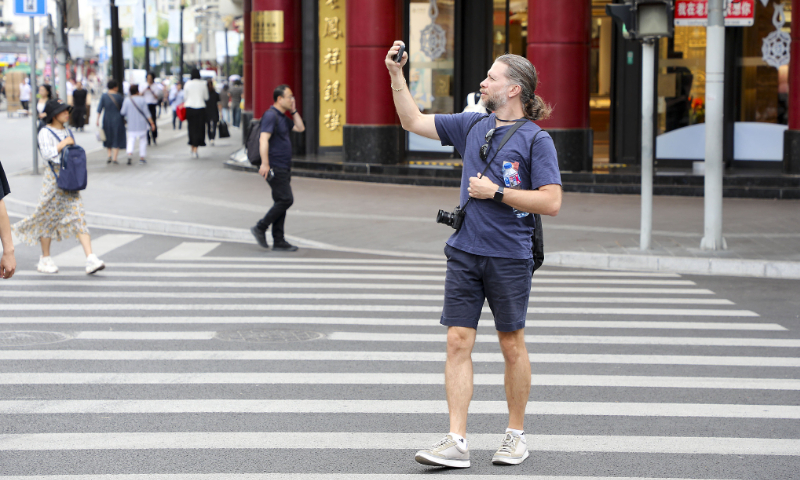A foreign visitor in Shanghai Photo: VCG
The World Economic Forum recently released the Travel & Tourism Development Index (TTDI) 2024. China is the only developing economy to enter the top 10 in promoting tourism development, ranking eighth. Looking at the top 30, high-income economies account for the vast majority. TTDI includes the evaluation of five major dimensions: enabling environment, policy support, infrastructure and services, tourism resources, and sustainability, and extends to 102 independent indicators. It’s an important indicator of a country’s tourism status and related to a very comprehensive measure of development. Echoing this ranking, many foreign vloggers recently traveled to China and said that the true face of China is completely different from how Western public opinion describes it. Videos with themes such as “unexpected” and “turning into fans” have become a hit on social media.
For ordinary people, what is more intuitive than the index is experience. For example, a British family of five traveled through China and was deeply fascinated by the convenience of China’s high-speed rail and takeaway express delivery. There were also vloggers who were amazed by the modernization level of Chinese city Guangzhou and marveled at the sense of future in Shenzhen. There are also vloggers who believe “this is one of the best impressions we have of a country so far” after landing in China. These vloggers have a common feeling that China is completely different from what they imagined. They have heard too many negative narratives about China from Western public opinion and politicians, and even felt anxious and uneasy before they came. However, after arriving in China, they were “surprised” to find that it is very safe, convenient and hospitable.
As more and more foreigners come to China to travel, such video content is becoming popular. If there is a “code” for the high number of hits, it is that these vloggers understand the real China through travel, the most direct way. They use the contrasting sense of personal experience to break through the barriers of Western public opinion and the ideological obstruction, and bring many people the real and fresh knowledge about China. Some vloggers said that in the past, they viewed China from a very narrow perspective and learned almost no knowledge about China in school. The message from the media and politicians was: “China is in decline, China is dangerous, and China is evil.” When these vloggers choose to actually visit China and see it for themselves, what they witness firsthand is a vibrant and beautiful China.
As is known, despite the end of the epidemic for quite some time, many foreigners’ perceptions of China are still influenced by negative narratives in Western media, travel warnings issued by some countries, limited flight numbers, and other factors. In fact, one of the biggest features of cross-border tourism is that it can break the stereotypical impression or even prejudice against a certain country through tourists’ own experiences. These travel vloggers, through methods like vlogging and live streaming, document their experiences in China, allowing their firsthand impressions to reach any corner of the globe via the internet, which exponentially amplifies the power of dispelling the prejudice.
These videos attract a large number of comments, which, in terms of content, far exceed the scope of typical travel reviews. Many netizens criticized the distorted reports by Western media, which prevent people from understanding the real China. They praised these vloggers for breaking through the onslaught of Western propaganda and showing the truth to everyone. Some netizens were influenced and expressed their intention to personally visit China. Others exclaimed, “China is not our enemy; ignorance is our enemy.” In this sense, these vloggers are actually acting as “bridges.” In the past, this role was largely supposed to be fulfilled by diplomats and media. Clearly, some individuals in certain countries haven’t fulfilled this role effectively and have even had a counterproductive effect.
Stereotypes have long existed among different cultural groups, but now the stereotypical impressions of China in the Western world cannot be simply explained by stereotypes. Some media and politicians deliberately smear and distort information about China, wrapping Western society in a membrane of rumors and rhetoric. These vloggers, from the perspective of ordinary people, effectively pierce through this membrane using self-media, a form of communication that is very intuitive. They break through traditional filters, creating cultural shock. If one person’s words may lack influence, when ten, a hundred, or even more people speak out, the trickle of voices can converge into a counterforce that surpasses the torrent of rumors and smears against China.
In the first quarter of this year, the number of foreigners visiting China increased more than threefold compared to the same period in 2023. A total of 466,000 foreign visas were issued, representing a year-on-year increase of 118.8 percent. Additionally, 1.988 million foreigners entered China on visa-free policies, marking a 266.1 percent increase compared to the previous year. China is continuously improving measures to facilitate the entry of foreign nationals. We also welcome more foreign friends to come to China, to create more heartwarming stories of exchanges between China and the world, and to discover more dynamic and mutually beneficial cooperation opportunities.

